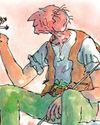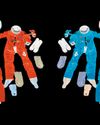
The warm, wet winter has meant hay fever season arrived early this year and pollen counts are forecast to be high. For about 20% of New Zealanders that means dealing with unpleasant symptoms, such as itchy and watery eyes, frequent sneezing, headaches and dizziness, sore throats and blocked noses.
Urban hay fever sufferers often blame the surrounding countryside for their symptoms, but the latest research suggests that may not be the case.
Philip Taylor, of La Trobe University in Melbourne, was part of a team of international scientists who have studied how far hay fever causing particles such as pollen and fungi can travel in the atmosphere.
They took air samples at the Amazon Tall Tower Observatory, a base in the middle of the rainforest of northern Brazil which has two research masts, the taller of which is 325m.
"It's the last pristine air on the planet," Taylor says.
Clouds of Saharan dust have been detected there, having blown thousands of kilometres across the Atlantic Ocean.
However, pollen particles are bigger, and the team's sampling showed that rather than rising into the air and scattering over long distances, pollen tends to travel low to the ground.
These giant aerosols generally don't achieve the height required for long-range transport, explains Taylor. "You need a lot of atmospheric force, a convective storm [strong thunderstorm] to make that happen."
Biophysics is telling us that the causes of urban hay fever are most likely to be closer to home, and Taylor points to ryegrass as a particular problem. We use it in our city gardens, parks and sports grounds, as well as in rural areas for animals to graze on.
Diese Geschichte stammt aus der October 22, 2022-Ausgabe von New Zealand Listener.
Starten Sie Ihre 7-tägige kostenlose Testversion von Magzter GOLD, um auf Tausende kuratierte Premium-Storys sowie über 8.000 Zeitschriften und Zeitungen zuzugreifen.
Bereits Abonnent ? Anmelden
Diese Geschichte stammt aus der October 22, 2022-Ausgabe von New Zealand Listener.
Starten Sie Ihre 7-tägige kostenlose Testversion von Magzter GOLD, um auf Tausende kuratierte Premium-Storys sowie über 8.000 Zeitschriften und Zeitungen zuzugreifen.
Bereits Abonnent? Anmelden

Sights to behold
Being blind didn't deter Aucklander FRASER ALEXANDER and his partially-sighted wife from travelling in Europe. Their memories were shaped by sound, touch and smell.

Pages of delight
Charming survey of children's literature throughout the centuries should be treasured and reread.

Heart of the matter
Women are less likely to be diagnosed with heart disease than men, and less likely to get best treatment. Researchers are struggling with old stereotypes to right the balance.

Balaclava beats
Their paramilitary shtick is intentionally menacing, offensive and alienating, but to be fair to the hip-hop trio Kneecap, their infamous balaclava is disarmingly hilarious. Kneecap, the 2024 movie that offers a fictionalised account of their rise to fame, is a Bafta- and Oscar-nominated Northern Irish film sensation.

Friends like these
One of the stranger characteristics of the populist oligarchy mobilising around Donald Trump's new administration is the interest taken in the domestic politics of the UK.

Irresistible force
A new documentary about gentle rugby giant Jonah Lomu reveals little but is a reminder of what made him special.

Fleeing the nest
A tale of building a new life after an abusive relationship makes for an impressive debut.

Life less ordinary
Chelsie Preston Crayford follows a big 2024 with a new comedy role and putting the finishing touches on her debut feature as a director and writer.

Not on our watch
Nasa, one of the most technologically advanced organisations on the planet, made prospective astronauts take inkblot tests to determine their sexuality.

No free lunch
The new, cut-price school lunch programme will shut out many community providers. But will bulk-supplied meals meet children’s needs?